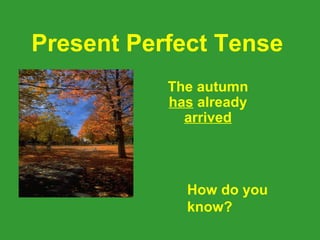
Present Perfect use
- 1. Present Perfect Tense The autumn has already arrived How do you know?
- 2. Present Perfect Tense FORM: have / has + past participle Affirmative: I have seen the film before. She has seen the film before. Interrogative: Have you seen the film before? Has she seen the film before? Negative: They haven’t seen the film before. He hasn’t seen the film before.
- 3. Present Perfect Tense Uses of the present perfect 1- Recent events: It is used to describe recent events without a definite time. The idea of time or place in the speaker’s mind makes the event recent. A time expression may emphasize recentness: just, recently, lately Why are they so happy? They have just won a prize so they are really pleased
- 4. Present Perfect Tense 2- Personal experiences: It is used to express personal experiences, there is not a definite time given. The time expressions ever and never are very often used with this meaning I have never been to Japan. Have you ever been there?
- 5. Present Perfect Tense 3- It is used to express actions that started in the past and continue to the present, the time period is not finished. We use for and since with this meaning. We use for with periods of time and since with points of time. I haven’t eaten since yesterday morning. I am really hungry I haven’t drunk anything for two days. I am terribly thirsty
- 6. Contrast between Present Perfect and Past Simple We use definite expressions with the Past simple tense: yesterday, last week, … ago etc, while we don’t use definite time expressions with the Present perfect tense. I have been to France three times When did you go there last? I went there last Summer
- 7. Contrast between Present Perfect and Past Simple Gerald has bought a new car. He bought it last week. Have you met Ray? – Yes, I met him when we were students. My parents have been to India. In fact, they went there twice last year. Has anybody phoned me? – Yes, Joyce phoned an hour ago. I’ve seen that man before. – Really? When did you see him?
- 8. Present Perfect Tense Have you ever listened to classical music before? Where did you hear it?
- 9. Present Perfect Tense Have you walked along a riverside similar to the one on the photograph? When did you do it?
- 10. Notice the difference • He has been to London. Now he is here. He can tell you wonderful stories about London. • He has been in London for two weeks. He is still in London. • Where’s Peter? He has gone to London. He is in Italy or on his way to London.
